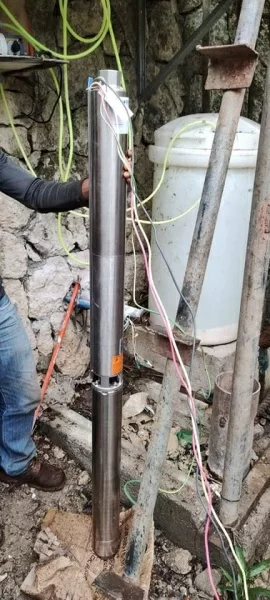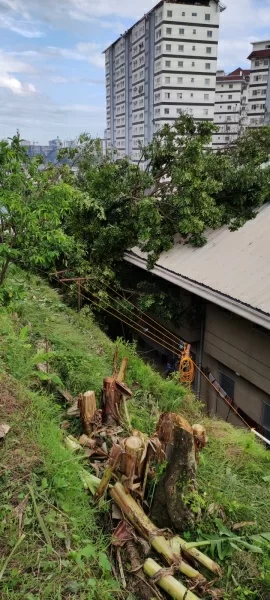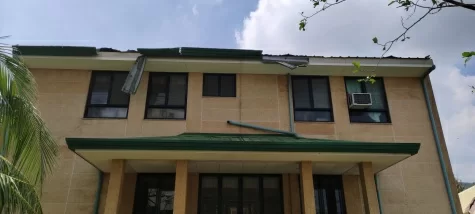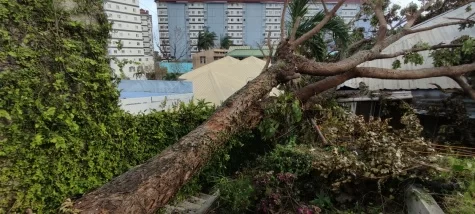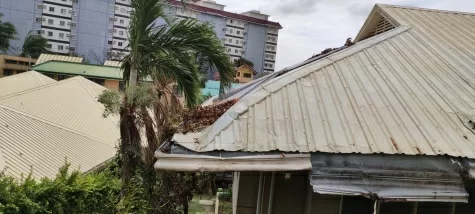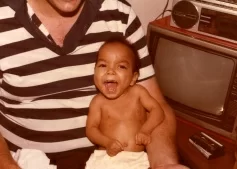 without a thought on my part. But Luke came to my mind yesterday and I looked up some information on him and discovered that his birthday had just passed. I found this old article that I wrote about Luke a few years ago. I thought I'd share it again. I am convinced that there are important and significant lessons we can learn from his life, and that I need to regularly share what I think they are. I hope you enjoy this!
without a thought on my part. But Luke came to my mind yesterday and I looked up some information on him and discovered that his birthday had just passed. I found this old article that I wrote about Luke a few years ago. I thought I'd share it again. I am convinced that there are important and significant lessons we can learn from his life, and that I need to regularly share what I think they are. I hope you enjoy this!The mysteries of God are a part of the Christian life that can often lead to confusion, doubt and even discouragement for believers.
- For some, it's a pride thing. We want to have answers – we want to understand, to be able to grasp the complexities of Biblical truth and God's plan for mankind.
- For some, God's mysteries – the unexplained things of life – are stumbling blocks to faith:
1. Why do bad things happen to good people?
2. Why does He allow pain, suffering and evil to thrive in our world?
Several months ago we were witnesses to the aftermath of the tragedy in Pennsylvania involving the Amish community, where, good, decent, hard working, non violent people were subjected to unspeakable cruelty towards their children. How can this happen?
3. One of our CSC children, who grew up in the worst poverty imaginable in Cebu City, was adopted into a family in the United States several years ago. Well meaning people would tell her how lucky she was and how God obviously had a wonderful plan for her life. She had a hard time with that and would sometimes ask her parents, "But what about all the kids who are still there, who weren't adopted, and who are still suffering and dying? What is God's wonderful plan for their lives? Why me and not them?
For many of us, we celebrate the goodness of God in our lives, we praise him for his healing, for material comforts, for blessing our efforts – even as we observe people who remain sick or disabled, who suffer in poverty – those who efforts and initiatives end in disappointment and ruin.
There are two extremes in terms of people's reactions to the things about God and life that are not understood.
1. There are those who try in vain to grasp the ungraspable – to be able to reduce the mysteries to understandable formulas or explanations. I remember a young seminarian who came to Cebu and who filled the pulpit of our church on a Sunday evening. He preached for an hour on the "peace of God that passes all understanding." Perhaps he felt that if he preached long enough he could crack that nut and open our understanding!
We all know those who have reduced the book of Revelation to precise charts and timetables, giving us easy to understand categories for all of human history and, most especially, the times to come.
2. A second category are those who shake their heads and say, "We'll only know these answers when we get to heaven." They suspend inquiry, not bothering to seek answers to the perplexing questions of life.
Living and working in a Third World country like the Philippines brings some of these mysteries to the front of our lives. Poverty, and all that goes with it, is "in your face." People often ask me "How do you like living in the Philippines?" That's a tough one to answer. Life anywhere has its highs and lows. Some days are great, others are difficult. I often answer this way:
1. When I'm sitting down to a nice breakfast I am aware that, within a few meters of my house are families that have no breakfast.
2. When I'm driving to the office or the Shelter I often pass people walking along the road who, for lack of a few cents can not even afford public transportation and must walk.
3. When I stop to buy medicine for my family or the CSC kids, there are people standing nearby whose children are dying for lack of that very same medicine.
Why am I blessed and they are not?
I recall a conversation with a missionary a few days after Cebu was hit by a strong typhoon. Many of our CSC workers lost their roofs or their entire homes. The houses of the poor were devastated by the high winds and torrential rains. The missionary said that it had been such a miracle how God spared the missionary homes from damage, holding his hands of protection around us during the storm. I remember wondering whether it wasn't more a matter of our having cement houses and strong metal roofs.
Why did our CSC kids have to suffer so much? And how much more, those who live on the street and cannot be admitted to CSC?
These are tough questions. When it comes to trying to understand our own suffering, the Bible gives some answers. For example, Romans 5:3-4 tells us that suffering produces perseverance, perseverance character, and character, hope. And the Bible gives us additional hope that we will someday come to see God's purpose and mysteries:
"But now we see through a glass dimly, but then face to face."
And we hear the testimonies of Christian brothers and sisters who have lived through terrible times and have turned negatives into positives in their lives.
Several months ago I was attending a conference in Bismark, North Dakota. One of the featured speakers was Steve Saint, Steve's father, Nate Saint, was one of the five missionaries killed in 1956 by Aucan warriors in Equador. Steve told about what that tragic day meant to his family, and what it was like when his dad, his hero, didn't come home that day. We saw video of his current family life, and saw a man who was interacting with Steve's children, and who was being referred to as "Uncle." It turns out that this was the very man who had killed Steve's father, who had come to know Jesus and had experienced the forgiveness of God and of the Saint family and now was a part of their family – an amazing story of how good things had come out of tragedy and suffering.
So the clear message is that God has a plan for our lives, we will discover that plan in the right time. He is writing our life's stories, but some of the chapters are difficult ones.
We can understand this. We can, when aided by the Holy Spirit, see how difficulties and suffering are part of a purification process for us, and that we, like Job, will eventually be better people for it.
But what about people who, because of major disabilities, are unable to understand their situation, unable to discern the hand of God or his plan for their lives. Where is the purification and growth and ultimate value for these people? What could God's purpose possibly be?
Back on 1982 a baby was born in a charity ward in a small hospital in Cebu City. 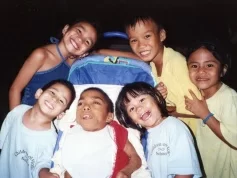 The baby underwent cardiac arrest during birth and was without oxygen for an extended time. Unlike many cases of charity patients, the hospital staff decided to resuscitate the baby, even after he had suffered massive brain damage and cerebral palsy. The baby's mother abandoned him in the hospital, and after a couple months Luke was referred to CSC. When we took him in he appeared to be a bouncing baby boy. We did not know that he would not develop physically beyond about a year and a half, or mentally beyond a few months. Luke would never speak, nor have voluntary movement of his arms or legs.
The baby underwent cardiac arrest during birth and was without oxygen for an extended time. Unlike many cases of charity patients, the hospital staff decided to resuscitate the baby, even after he had suffered massive brain damage and cerebral palsy. The baby's mother abandoned him in the hospital, and after a couple months Luke was referred to CSC. When we took him in he appeared to be a bouncing baby boy. We did not know that he would not develop physically beyond about a year and a half, or mentally beyond a few months. Luke would never speak, nor have voluntary movement of his arms or legs.
Luke became a fixture at CSC. For over 23 years he was an integral part of our lives and a symbol of CSC and what we are all about.
Many times Luke would be hospitalized – often due to upper respiratory infections. He fought for his life many times. There were at least a dozen times when we were sure that he would die. The doctors had told us that he wouldn't make it past five years old. Then they revised it to nine, then 11 – certainly he wouldn't reach his teenage years.
One time, when Luke was critically ill our staff met to pray and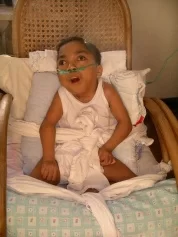 I asked them to reflect on his life. Here is why: I believe that God had a purpose for Luke's life when he created him. I believe that He uses people like Luke to teach us important things. But here is the rub: If we don't spend time reflecting on these lessons, then Luke's life is useless. Its up to us to allow God to make sense of Luke's life.
I asked them to reflect on his life. Here is why: I believe that God had a purpose for Luke's life when he created him. I believe that He uses people like Luke to teach us important things. But here is the rub: If we don't spend time reflecting on these lessons, then Luke's life is useless. Its up to us to allow God to make sense of Luke's life.
And what are the lessons that we found? What has God taught us through his life?
1. First, life is precious. Even though he had nothing to live for, from the world's point of view, Luke clung to live almost ferociously. Some of us who have much more to live for take life casually, we take life for granted. Not Luke. Every day was a struggle. Every breath had to be fought for. Life is a gift from God and we should treat it carefully.
2. God has provided us with opportunities, through Luke's life, to minister to him in significant and life-saving ways. He has provided an avenue for us to live out the biblical mandate to minister unto the "least of these," because, truly, Luke was in that category. Hundreds of people have been given a blessing to participate in the support of CSC that reaches out to children like Luke and many others with other special needs.
3. In so doing, He has given us a chance to show others a Godly value system that doesn't reserve love and attention for those who have something to give back, or who have "potential" or a bright future. For many people who live in a developing country, where resources are limited, this has been a difficult lesson to learn. How could we justify spending so much money for Luke's hospitalization when other, "normal" kids needed care? Luke's life gave us the opportunity to teach about the value of life and about how God looks at all of us.
4. Luke has been a tremendous ambassador for CSC. People around the world remember observing the loving care that he received by our staff and workers. They remember his famous smiles. They may quickly forget the names of the staff or other children, but they remember Luke. "How's Luke doing?" we get asked wherever we go to talk about the ministry of CSC. And our care of Luke helps us explain the true nature and core values of our work in the Philippines.
5. Luke has been a safety valve for those that had an opportunity to know him. My job as Field Director of CSC involves lots of administrative chores, like making budgets, government relations and various kinds of problem solving. There are days when I get stressed out and start to feel the weight of the world on my shoulders. But all I needed to do is to drive a few short miles to where Luke lived, to hold him in my arms, and I get a clear picture of what real struggles are all about. My struggles paled in comparison to what Luke faced every day. Self pity may be easy for some people, but those that knew Luke have no excuse for feeling sorry for themselves. What a great gift that was to all of us.
A little over a week before we left Cebu, Marlys called me on my cell phone and told me that I should get to the hospital quickly, as Luke wasn't doing well. He had been hospitalized for over a week and his breathing was bad. I had gotten messages similar to this one throughout Luke's life, so I went to the office and took care of a few things. But the Lord laid it on my heart to go see Luke and when I entered his room his breathing was extremely labored. He looked different than I had ever seen him, and it became clear that he was dying. I sat down next to him, kissed him and looked into his eyes. For 23 years we had loved this boy. It wasn't easy to say goodbye. I said to him, "Luke. You can go. Go to be with Jesus, Luke. I love you." Within a couple of minutes Luke took his last breath. 23 years of pain, suffering, limitations, hospitalizations, forced breathing, skin rashes and infections were over. We would never see Luke's smile again.
As Luke was dying in that hospital room, I made a promise. I'm not sure if I was making a promise to Luke, to God or to myself. But I decided then and there that I was going to talk about Luke on our coming furlough. I believed then and do now, that the church of Jesus Christ needs to hear about Luke, that the lessons of his life are important ones. Many Americans are complainers - full of self pity. People who have so many material comforts are unsatisfied. American discourse is increasingly a chorus of victim and entitlement claims. Charles Sykes, in his book "A Nation of Victims: The Decay of the American Character" states that, "in a nation where everyone is a victim, no one is a victim." In our preoccupation with our own needs we have a hard time seeing the needs of others – people like Luke.
In his song "God Help the Outcasts," the Hunchback of Notre Dame poses several difficult issues:
I don't know if there's a reason
Why some are blessed, some not
Why the few You seem to favor
They fear us, flee us,
Try not to see us.
The first part we have already examined. The second is our call to arms. "Why the few You seem to favor, they fear us, flee us, try not to see us."
I don't know what factors might make it difficult for us to see the needs of society's outcasts. Perhaps we are too busy. Maybe our personal and church calendars are so full that there just isn't room for Luke, or the man who had fallen to thieves at the side of the road, to break into our day. Maybe we are numbed or fatigued by the needs of others, or simply overwhelmed by the circumstances of our own lives. Maybe we have become cynical. "Why did that guy travel this road at this time carrying that amount of money? He deserves what he got!"
Maybe, just maybe, Luke can help cut through the apathy, the self-centeredness and cynicism of our lives. He was a person with significant needs that he didn't cause. He was totally dependent on others to live. His life had none of the possibilities and opportunities that we take for granted every day. He needed us so very much. Maybe Luke can serve as a symbol of many others that we come into contact with. Maybe Luke can help us rescue our lives.
A Change of Scenery
Prior to Covid, one of the things that children at CSC looked forward to was an appointment off campus. Older kids loved going to the dentist and getting an ice cream treat after. Younger kids were excited just riding in vehicles and seeing all the cars and motorcycles. These have not been an option since the shelter has been on lockdown. Medical consultations have been completed online, lab tests are done in the infirmary, and even eye check-ups are done at the shelter now.
There were a few exceptions, including for this five-year-old boy, who left campus recently for a hearing test. On the way, he looked through the window of the vehicle with a sparkle in his eye! It was as if everything was new to him. He pointed and described every truck and car, as well as the people and animals on the road.
This boy was so sickly prior to the pandemic, and he spent a lot of time at clinics to see a pediatrician or pulmonologist. And there he was now, just going for a routine hearing test. The CSC lockdown has somehow kept him healthy, away from all the dust that caused his frequent asthma attacks. But it has also limited his exposure to the environment outside the CSC walls. Through it all, he was one happy kid, having to spend a few hours outdoors.
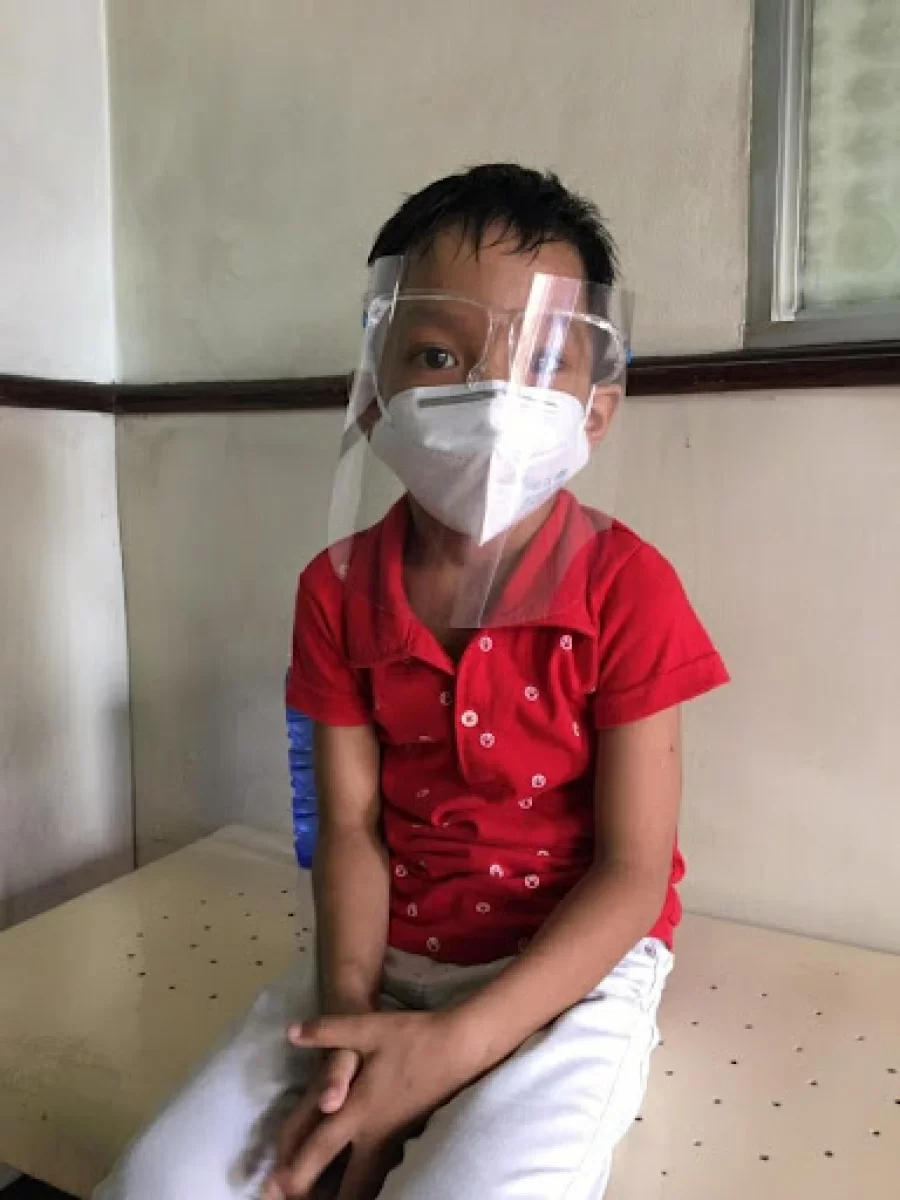
Beauty and Madness
They said that time heals. True. However, time alone could not do all the stitches. Most of the children here in CSC have a myriad of wounds to heal from their past. A wound on their knees would only take a week to heal but a wound made when no one helped them to get up would take years, a hundred of CSC outings, and relationships. Some have spent most of their childhood here. And that's a lot of time yet most of them are still haunted by the ghosts of their past— the phantom of neglect, rejection, abandonment, and the monstrous impact of separation from their significant others. Time is not enough.
I've been working with these children for three years and I've witnessed how these ghosts have influenced their behaviors and perspective of their own selves and their lives. Despite these, I've also observed how the love and care provided by the houseparents, aunties (caregivers), and other staff in CSC have greatly lessened the grip of these ghosts in their lives. Because of this, children have retaken the cape of their childhood. Trust has sprouted again and has blossomed into friendship and family. It is truly magical to witness how a child trusts an adult again. A positive and healthy relationship is, for me, the greatest healing the child could have. In counseling, we highly value relationships as this always precedes any counseling techniques. Although it has always been a challenge gaining the children's trust, art has paved the way for us, counselors, to see and hear their stories. It has been a great tool for us to deal with resistant children in counseling. Art allows the child to express himself/herself in ways he/she is most comfortable to. It allows the child to "reflect their inner worlds, depicting various feelings" (Malchiodi, 1998). Art helps the children share their stories to us in a non-threatening way. It allows the child to have full control of their creation. Painting, drawing, music, and photography are the usual art modalities chosen by the boys.
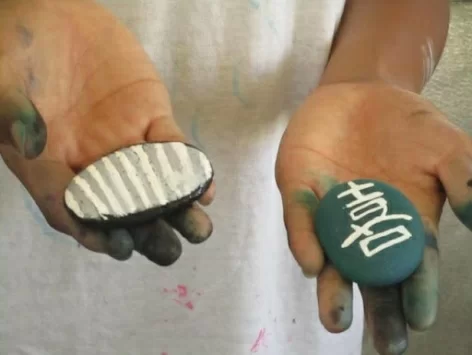
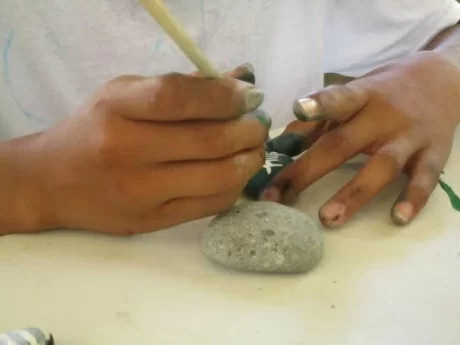
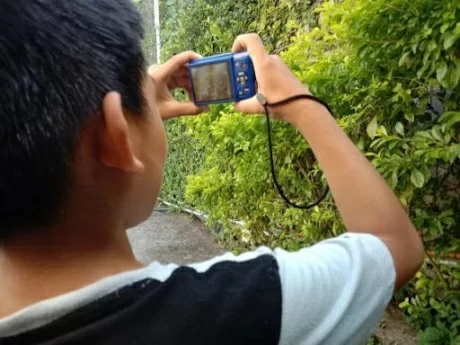
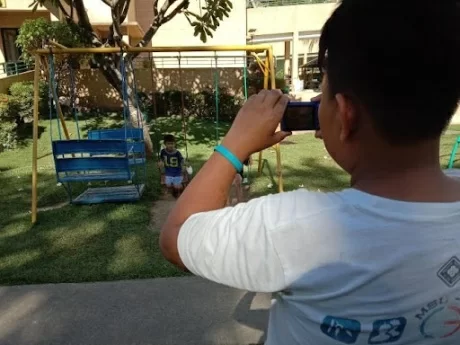
The pictures above are just some of the ways to utilize art in helping children become aware of the ghosts of their past. Some, especially the older ones, have slowly faced their past in a more positive and hopeful way. I am hoping that the time they spend here in CSC would help them see the collateral beauty in pain.
They said that time heals. True. It is true but time is not enough to do all the stitches. Instead, time allows our crushed spirit to get up; to acknowledge pain and becomes familiar to it; to understand that our pain has an ending; to have relationships blossom; to ignite a new dream; to see that all along God has been stirring the wheel. And time helps the children to better understand that "all things work together for good to those who love God, to those who are called according to His purpose." (Romans 8:28, NKJV).
Love in Any Language
Most of us, if not all, have been taught by our parents or guardians to say "I Love You." Though we might not know what that means at a very young age, as it's hard to fathom what love is when you're three years old. But over time, with experience, we understand what it means.
Our homes at CSC are not only a place of refuge for the children we serve but also a place of love.
Most of our caregivers have been working with us for more than a decade. And in that time, some of them have formed a special bond with the children they care for. Likewise, our children have found a safe place with their caregivers. They have learned what it feels to be valued and loved.
One particular 6-year-old boy recently knew that his Auntie (his caregiver) lost her husband years ago. That meant his Auntie no longer had her loved one with her. And because he loved his Auntie, he offered to be her husband. For sure the little boy is unaware of what it meant. But for him, it was an innocent and genuine act of love. The scenario was cute and funny, but it tugged the hearts of our caregivers.
The children at CSC come with different stories and different abilities but we love them all the same. And that speaks heavily to the children as they also see sameness and no difference in one another.
A new child joining the CSC family is welcomed with so much love. The same way a child is hugged with so much love by his friends before he leaves and joins his forever family. Love remains even after a child leaves the shelter. It remains no matter how near or far the distance is. Love continues in the heart of a resident as he spreads his wings into the community and in the heart of a child as he starts forever with a family. Still love continues in the hearts of parents who welcomed a new member of the family.
1 Corinthians 13:4-7, 13 NIV "Love is patient, love is kind. It does not envy, it does not boast, it is not proud. It does not dishonor others, it is not self-seeking, it is not easily angered, it keeps no record of wrongs. Love does not delight in evil but rejoices with the truth. It always protects, always trusts, always hopes, always perseveres...And now these three remain: faith, hope and love. But the greatest of these is love."
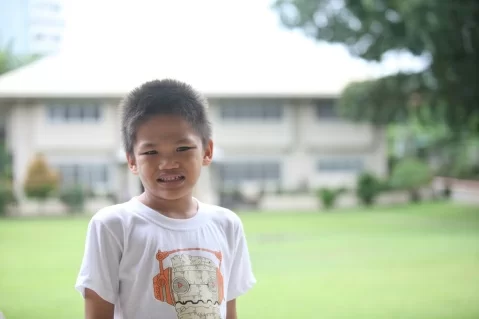
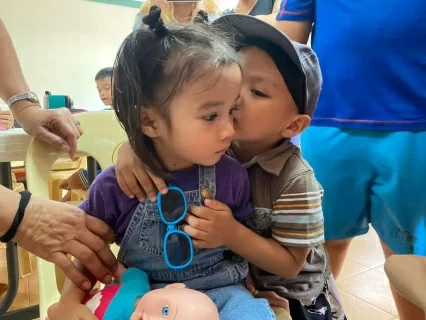
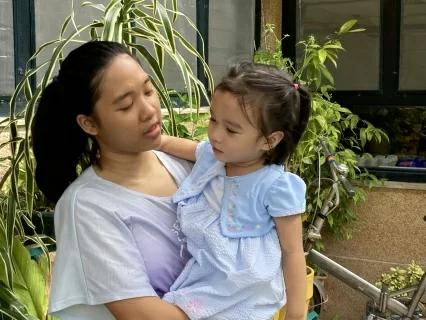
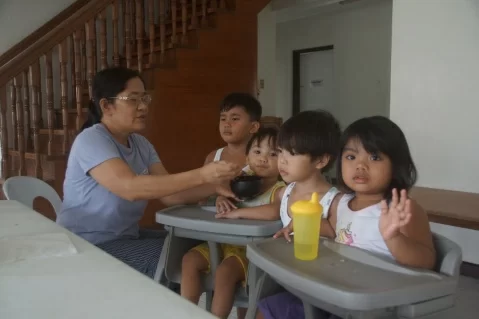
CCHS Update
We're back!
CCHS is back on track. After the "storms" that made us clasp our hands and bend our knees in prayers, the Lord has been gracious and faithful to His children.
Our water pump was replaced with a new one so we can have flowing water in all of our faucets. Thanks to Uncle Jerry and his men who made this possible.
Our supplier of drinking water also delivered in the afternoon. This same day we quarantined twenty-three workers at CCHS.
Our power from the grid was reconnected. We had been using our generator in the evenings for lights, fans, and charging our laptops and cellphones.
And soon, our internet will be restored. We are finally back to teaching children at the shelter. We praise the Lord for preserving our lives and sustaining us through the "storms".
With this journey we are grateful for those who prayed for us and to those who supported us in many ways. You made a lot of things possible on this side of the globe. You have allowed us to make a difference in the lives of the children in the shelter.
Lamentations 3:22-23 (English Standard Version)
"The steadfast love of the Lord never ceases; His mercies never come to an end;they are new every morning; great is your faithfulness."
Praise the Lord!
Typhoon Clean-Up
The first thing that we repaired after the typhoon was power lines so we could use generators. Then we worked to fix the broken main pipe that supplied water to both Cherne home and Eicher home, including the wash house. Next was the power lines that will receive VECO power. The clearing was not so hard because we were able to use a small chainsaw for the smaller branches and trunks. But for the big ones like the one that falls to Cherne home we need to hire someone with a big chainsaw and knows how to do it so as not to add additional damage to the building. One of the challenges is, it's hard to find one because they are occupied in their neighborhood itself. With scarcity of materials, prices become more expensive. Another challenge was communication. It was very hard to contact people to get materials with no internet and electricity without the generators. Drinking water was another problem but we are thankful to God CSC has its own deep well and gensets.
We will continue to repair the shelter and support our friends and family through this time. All glory and honor to God because he is the source of all those strength, wisdom, resources and dedicated supporters to continue the work of the CSC ministry.
